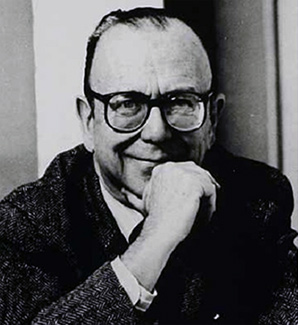Robert Heilbroner facts for kids
Quick facts for kids
Robert Heilbroner
|
|
|---|---|
 |
|
| Born | March 24, 1919 |
| Died | January 4, 2005 (aged 85) New York City, New York, United States
|
| Scientific career | |
| Fields | Economics |
| Institutions | Federal Office of Price Administration,
New School for Social Research, Wall Street commodities firm. |
Robert L. Heilbroner (born March 24, 1919 – died January 4, 2005) was an American economist. He was also a historian who studied the ideas of famous economists. Heilbroner wrote about two dozen books. He was best known for his book The Worldly Philosophers (1953). This book explored the lives and ideas of important economic thinkers. Some of these thinkers included Adam Smith, Karl Marx, and John Maynard Keynes.
Contents
Robert Heilbroner's Early Life and School
Robert Heilbroner was born in New York City in 1919. His family was wealthy and had German Jewish roots. His father, Louis Heilbroner, started a men's clothing store.
Robert went to Harvard University. He graduated in 1940 with top honors. His studies focused on philosophy, government, and economics. During World War II, he served in the United States Army. He also worked for the Office of Price Control. There, he worked with John Kenneth Galbraith, another well-known economist.
Robert Heilbroner's Career and Ideas
After World War II, Heilbroner worked briefly as a banker. In the 1950s, he started working in academics. He became a research fellow at the New School for Social Research in New York. He was greatly influenced by German economist Adolph Lowe during this time.
In 1963, Heilbroner earned his Ph.D. in Economics. He received it from the New School for Social Research. He later became a professor there in 1971. He taught courses on the history of economic thought for over twenty years.
Heilbroner saw himself as a "worldly philosopher." This meant he focused on real-world issues like how economies work. He combined ideas from history, economics, and philosophy. Even though he was unique, other economists respected him. He was chosen as Vice President of the American Economic Association in 1972.
Heilbroner also created a way to sort different types of economies. He described them as:
- Traditional: Mostly based on farming, like a subsistence economy.
- Command: Where the government plans everything, like a planned economy.
- Market: Based on capitalism, where people and businesses make decisions.
- Mixed: A mix of command and market systems.
Heilbroner was a socialist for most of his life. However, he made a famous statement in 1989. He wrote that the competition between capitalism and socialism was over. He believed capitalism had won. He said capitalism organized human affairs better than socialism.
In 1992, he wrote that "capitalism has been as unmistakable a success as socialism has been a failure." He praised economists like Milton Friedman and Friedrich Hayek. They had always argued that free markets were better. He also noted that democratic freedoms usually appear in capitalist countries. Heilbroner's favorite type of capitalism was like the welfare states in Scandinavia. He said his ideal society was "a slightly idealized Sweden."
Robert Heilbroner's Family and Later Life
Robert Heilbroner had two sons, David and Peter. He also had four grandchildren: Quentin, Katrina, Henry, and Sam.
Heilbroner passed away in New York City in 2005. He was 85 years old.
The Worldly Philosophers: A Famous Book
The Worldly Philosophers was published in 1953. It has sold nearly four million copies. This makes it one of the best-selling economics books ever. Only Paul Samuelson's Economics has sold more copies.
The seventh edition of the book came out in 1999. It had a new final chapter. This chapter looked at the future of economics. It hoped for a "reborn worldly philosophy" that included social ideas.
Here are some of the topics covered in the book:
- Introduction to economic ideas
- The start of the economic revolution
- The ideas of Adam Smith
- The predictions of Malthus and David Ricardo
- The dreams of the Utopian Socialists (like Robert Owen and Charles Fourier)
- The system of Karl Marx
- Economic thinkers of the Victorian era (like Alfred Marshall)
- The ideas of Thorstein Veblen
- The new ideas of John Maynard Keynes
- The contradictions seen by Joseph Schumpeter
- Thoughts on the future of worldly philosophy
Awards and Recognitions
Robert Heilbroner received several awards for his writing:
- 1979: Gerald Loeb Award Honorable Mention for Magazines
- 1984: Gerald Loeb Award for Editorial/Commentary for "Economic Prospects"
- 1985: Gerald Loeb Special Award for "The Deficit"
- 1988: Gerald Loeb Award for Magazines for "Hard Times"

